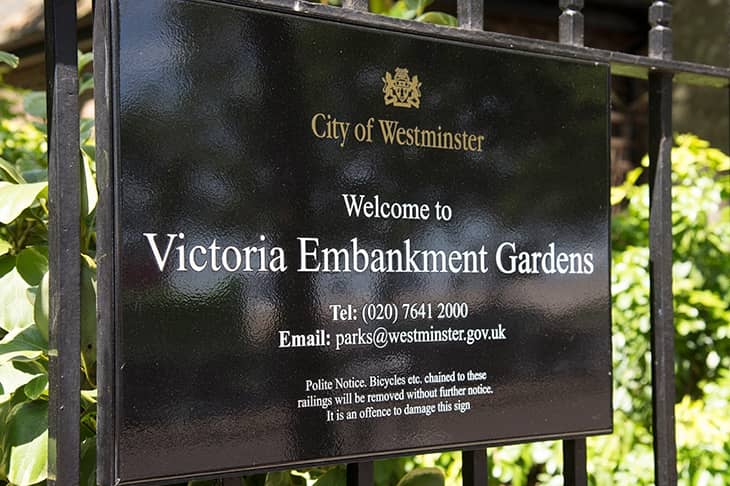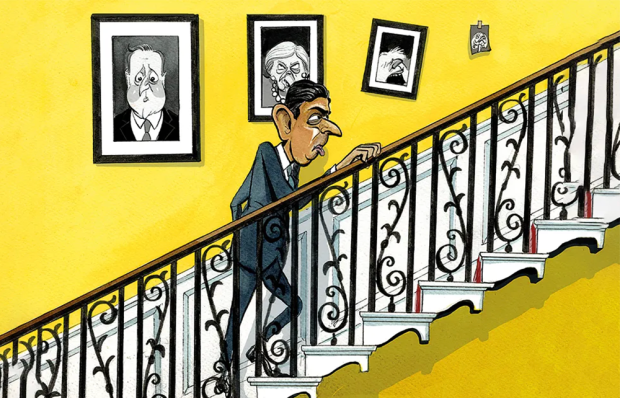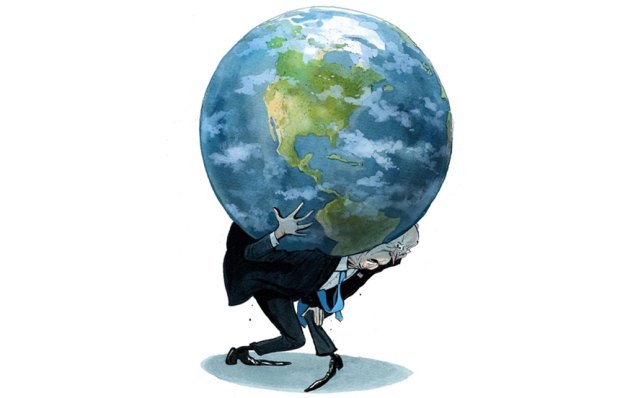I’m not one of life’s early risers but an exception had to be made on Wednesday last week. In an event organised by Lord Chadlington (Peter Selwyn Gummer), Michael Gove was talking about ‘levelling up’ to an invited audience at the Corinthia hotel in London. This was a breakfast meeting, doors open at 7.45, and I wanted to hear Mr Gove, a politician I know and admire.
So I was there. Gove was impressive. But in the end neither he nor the breakfast were what I’ll always remember about that morning. Around nine o’clock we tipped out on to the pavements by Embankment Tube station. It was a glorious morning, fresh and clear in the winter sunshine. I’m trying to prolong my life by doing more walking these days, so why not amble along to Temple station through the Victoria Embankment gardens – a long, narrow strip of London greenery parallel with the river that, oddly, I’ve never walked through before – and enjoy the morning air? The distance was hardly epic and time did not press. From the start, I felt a sense of release.
Once, as evidenced by the 1626 York Watergate on the northern side of the lawns, this verdant park was the river Thames; but when Sir Joseph Bazalgette put in a main sewer along what had been the water’s edge, it was decided to push the Thames back and reclaim the land for a highway and gardens above the sewer. Nearly 150 years ago the public park was born.
I recommend the promenade to any reader. There’s something Tardis-like about these beautiful and exceptionally well-maintained gardens. From the outside they look a bit, well, incidental: just a sliver of lawn, a few trees and some bushes. Enter, though, and you’re in a small but other world. Noise from traffic along the Embankment is muffled; the top of Cleopatra’s Needle, just over the road, can be seen through the shrubbery; and to your other flank rise the majestic facades of great, flat walls of solid London architecture, the Savoy hotel predominating. Thus enclosed, the romantic dream perhaps of some now-forgotten Victorian metropolitan superintendent of parks and gardens awaits you, a little Eden.
There are many memorials here, but mercifully intimate rather than monumental, and sometimes slightly peculiar: nothing grandiose. A fine bronze Robbie Burns sits contemplatively on a bronze log, his own inscription to his book of poetry carved here into stone: ‘The Poetic Genius of my Country found me at the Plough – and threw her inspiring mantle over me. She bade me sing the loves, the joys, the rural scenes and rural pleasures of my native soil, in my native tongue; I tuned my wild, artless notes, as she inspired.’
There’s an endearing memorial, too, to the first world war Imperial Camel Corps, topped by a delightful miniature bronze African camel mounted by a young soldier in a pith helmet carrying a telescope; another to Robert Raikes who more or less invented Sunday schools; and one to the anti-imperialist Liberal temperance campaigner, Sir Wilfred Lawson, a great humorist in his parliamentary days.
I passed and admired all these works of man, but nature too was sweet. There were flower beds, though bulbs were only just coming up. There were tree ferns – forest plants that to me have always seemed mysterious and primeval. There was a strange small tree, leafless, yet bearing its blossoms on its bare branches and twigs; and, beside the path, another I was unable to identify, stretching horizontally out a bare branch as heavy as a trunk, almost begging for a crutch.
But then my attention was arrested sharply – by a memorial bust to the composer Arthur Sullivan (W. S. Gilbert’s collaborator) which I swear has an eroticism so universal that it could almost turn your gay columnist straight.
And, no, that is not the representation of Sullivan, a rather stuffy-looking Victorian gentleman with a walrus moustache. Sir Arthur’s countenance is stern. Not so the young lady in bronze at the foot of the monument. She has thrown herself weeping upon the stone pedestal. Because (perhaps) she has so abandoned herself to grief, she has become careless as to whether or not her clothes stay on – and they haven’t, her only garment having fallen down to her waist. But what a sinuously sensual body! Words like ‘voluptuous’ or ‘nubile’ do not describe the lines, the curves, a posture that is both tantalising yet not without dignity. The left breast is pressed against the cold granite; the right is lovingly carved, the nipple erect. One has the impression that the sculptor, charged with a boring commission and unable to summon much interest in Sir Arthur, has poured all his passion into Sir Arthur’s weeping muse. Beside her we read these lines from The Yeomen of the Guard:
Is life a boon? If so, it must befall That Death, whene’er he call, Must call too soon.
On I went towards Temple. Occasions arise when the mind becomes unusually sharp, thoughts and feelings tumbling over each other. I was worrying about Ukraine, wondering about my friend Michael Gove’s future, thinking about the grand ballroom where I’d just breakfasted, the future of the Conservative party, the prospects for this new war, the prospects for the free world, and for mankind. And all at once, just as I approached the end of the gardens, there stood before me a mimosa tree, in full flower, cascades of yellow blossom billowing down amidst the green.
In Thornton Wilder’s great play The Skin of our Teeth, George Antrobus and his family live through every age, every planetary and human catastrophe, summoning history’s great philosophers and writers for explanation of the inexplicable, consolation for the inconsolable. At the end, having survived a stupid and devastating war, George (who is Everyman) breaks down in despair, having lost the will to go on. Then he learns that his library has escaped destruction. He grits his teeth and trudges onward. The play overcomes me with what, as I gazed at the mimosa, overcame me again last week. Not joy. Not sorrow. Not understanding. Not hope nor yet despair. I just felt indescribably moved. Pulling myself together, I walked on.
Got something to add? Join the discussion and comment below.
Get 10 issues for just $10
Subscribe to The Spectator Australia today for the next 10 magazine issues, plus full online access, for just $10.
You might disagree with half of it, but you’ll enjoy reading all of it. Try your first month for free, then just $2 a week for the remainder of your first year.















Comments
Don't miss out
Join the conversation with other Spectator Australia readers. Subscribe to leave a comment.
SUBSCRIBEAlready a subscriber? Log in